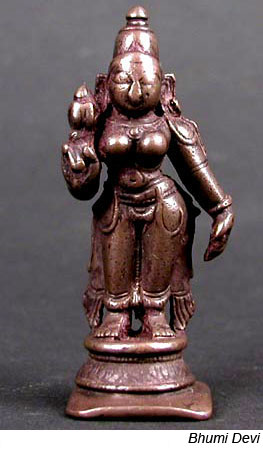A Brief Description of a Ritual of Waking
Within the Bhakti Tradition

In order to understand ritual, one must understand context. Within the Vedantic tradition of presentation there are three underlying principles: sambandha, the subject’s relationship to the object, abhidheya, the activity, and prayojana, or goal. A achieves C through B. In the case of the ritual of awakening we can look at these three principles in two ways.
- The subject is the sleeping practitioner.
- The goal is starting the day.
- The process is waking.
From a grander perspective the practitioner of bhakti is not just interested in waking up from sleep, but also in a more spiritual waking process that:
- Identifies their position as a bhakta.
- Identifies their goal, Krishna prema (development of love of God)
- Identifies their process, bhakti
We can now look at the waking ritual as two processes: rising from a night’s rest as well as rising from the illusion of the material world. By applying ritualistic concepts we are able to unify both objectives and pursue them simultaneously through the external material body and the internal spiritual form. The following is an excerpt from the Hari-bhakti-vilasa’s third vilasa describing the morning’s procedure:
pratah prabhodhito visno hrisikesena yat tvaya,
yad yat karayasisana tat karomi tavajëaya
O’ Visnu, O’ Isana, O’ Hrsikesa, this morning you have awakened me; whatever you wish, that I will do.(1)
By chanting this mantra one identifies the Lord in three different forms, Vishnu, the maintainer (even during our sleep) Ishana, the master of the world, and more specifically Hrishikesha, the master of the senses, which will now be active upon rising. Next, the mantra reminds one that He or she has been awoken by God. Finally, it helps one recognize one’s relationship to the Lord as a servant who is following the process of bhakti. This immediate realization upon waking helps to center the rest of the day’s objectives on life’s ultimate goal, love of God. It takes the practitioner out of the unfocused dream state and focuses their otherwise mundane daily habits on the reality of their relationship with God.
After awakening one is to place their right foot first on the ground while chanting the following prayer to the “Vishnu-patni”, also known as prthivi-mata bhumi, or mother earth:
samudra-vasane devi, parvata-stana-mandite,
visnu-patni namas tubhyam, pada-sparsam ksamasva me
O Goddess, wife of Lord Vishnu, you who are dressed in the oceans and who are decorated with the breasts of mountains, please forgive me for stepping on you.
Next, one is to look to where his or her daily activities will take place: the earth. As the earth provides food and shelter for us, she is considered one of the seven mothers of society.(2) The Taittiriya Upanishad 1.11.3 says matru devo bhava, the mother is respected as God. As she is also the counterpart of the Lord’s energy, we ask her to allow any inconvenience we cause her as part of the greater good of serving her and her Lord. Bhakti is thus seen as the only excuse for stepping on one’s mother. With this perspective the bhakta will not waste a step for any other purpose.
This short ritual is one of many performed each morning by the sadhaka that, as this discussion has tried to demonstrate, is not just a series of empty performances, but an opportunity to be mindful of every activity we perform each day.
Michael Buhler-Rose
(1) Translations by Mans Broo, used with permission
(2) The seven mothers according to Chanyaka’s Niti Shastra 5.23 are: the birth mother, the wife of the guru, the brahmani or wives of the brahmanas, the queen, cow, the earth, and the nurse (some say specifically the midwife).
Comments
One response to “Morning Rituals: Waking”
I thought the mantra upon awakening was quite impressive – we can come to immediately focus on the Lord and our identity as His servant. The objective of the day is promptly determined.
It’s so true that what comes first in a very tangible way affects everything that comes next. It’s like what someone called, the law of “psychic economics”. In each moment a certain amount of energy is available. Different choices that we make (in terms of thought, word and action) produce widely different results. But every choice affects our state of mind, either elevating it or causing degeneration. To start the day with such a clear concept of servitude is powerful. I’m going to use this mantra from now on. Thanks!